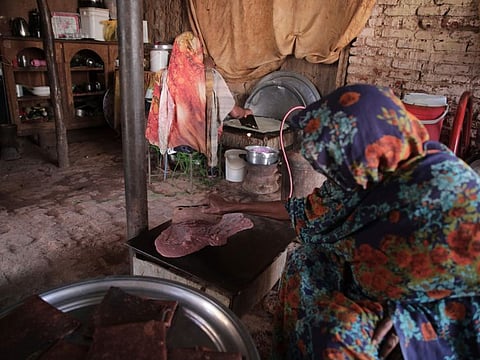Sudan’s speciality ‘bittersweet’ Ramadan drink
Helo-murr can be found on almost every table across the northeast African country

Om Eshr: As generations of Sudanese have done before her, Wissal Abdel Ghany crouched next to a fire to prepare a traditional drink, a thirst-quenching favourite enjoyed during the fasting month of Ramadan.
In Sudan, the arduously made “helo-murr”, which means “bittersweet”, is a drink synonymous with the Islamic holy month.
It can be found on almost every table across the northeast African country at the end of the day’s fast.
“Without it, our table feels empty,” said Abdel Ghany, wearing a bright orange headscarf.
She sat in a small room in the village of Om Eshr, on the outskirts of the capital Khartoum, which teemed with a small force of women busily scraping and spreading a mixture before serving the beverage in clear glasses.
The drink has satisfied thirsty fasters for decades and recipes are “inherited from our mothers and grandmothers,” the 43-year-old said.
Corn is harvested and left to dry in the sun before being ground and mixed with spices such as fenugreek, cumin or even hibiscus — Sudan’s other essential Ramadan beverage.
This mixture is then soaked in sugar and water for several days.
Abdel Ghany spread a layer of the thick brown paste over a grill plate above the coals of a wood fire, cooking it into a thin, leather-coloured film.
The resulting crepe-like layer is then peeled away and stored — ready to be soaked in the final step to create the beloved drink.
Served as cold as possible, the drink is one of many ways that fasting Sudanese cool off, a significant challenge in one of the world’s hottest countries.
Collective effort
The daytime fasting month of Ramadan is one of the five pillars of Islam.
Observant Muslims refrain from eating and drinking from dawn to dusk, after which they traditionally gather with family and friends to break their fast.
In Sudan, the brew is so identified with Ramadan that even the US embassy took to Twitter to promote its staff making it, with diplomats wielding wooden spoons over embers and sipping the amber liquid.
Abdel Ghany said preparing the drink is a collective effort, bringing “together our sisters and friends”.
“We make it together to share among ourselves”, she said.
In Sudan’s cities, she added, some people don’t make it themselves.
“But they still have to offer it for dinner, so they buy it ready-made”, she said.
For Abdel Ghany, the preparation of helo-murr and the holy month cannot be separated.
“All it takes is a whiff of the scent coming out of a home to know that Ramadan is here,” she said.



